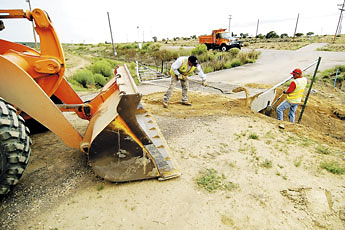|
Labor law hits 98%
Navajo Preference Act impact helpful, surprising

New Mexico Highway department workers Anderson Lee and Daryl Beyal
work Tuesday to temporarily fill in the dirt around a cattle-guard
on US-491 in Ya-Tah-Hey that has been washed away by the recent
rains. Beyal and Lee both said that their efforts were only a temporary
fix and the cattle-guard is scheduled to be replaced next week.
[Independent File Photo]
By Natasha Kaye Johnson
Diné Bureau

Wynema Tahe, a traffic controller with A.S. Horner Construction
Company, finishes putting together a road sign at the construction
yard on the corner of 491 and Maloney Avenue in this file photo.
[Independent File Photo] |
WINDOW ROCK — Fifteen years ago, in even the most rural part
of the Navajo Nation, it was common to see construction jobs filled
by non-Navajos. The Navajo Preference in Employment Act has since
turned that once normal sight into a rare one.
Although Navajo preference laws were implemented in the 1970's,
employment of Navajos within in the construction field on the Navajo
Nation still hovered around 43 to 46 percent in the mid-1990s. High
regulation of NPEA laws today has raised the percentage of Navajo
workers on Navajo Nation construction projects to between 96 to
98 percent.
"It had been in the laws, but we didn't really start it enforcing
it until the 1990s," Reynold Lee, director of the Office of
Navajo Labor Relations with the Division of Human Resources, said.
With summer beginning and construction projects popping up across
the Nation, the Office of Navajo Labor Relations is making sure
that companies are abiding by the laws and hiring Navajos. "If
we see a high number of non-Navajos (on a construction site), we
give them (hired companies) a week to hire Navajos," said Lee.
"There's no shortage of laborers."
With high unemployment rates on the Navajo Nation, Lee said making
sure that Navajos are given the opportunity to work is important.
Navajo preference laws and Indian Preference Law evolved from the
Indian Reorganization Act of 1934. The intent of the U. S. Congress
was to facilitate Indian self-government. While there was uproar
about Indian employment preference laws following its implementation,
the United States Supreme Court ruled that the Indian Preference
Law does not constitute harmful racial discrimination or violate
the due process clause of the Fifth Amendment, but is reasonably
and rationally designed to further Indian self-government. It is
a distinct statue that does not violate the Civil Rights Act of
1964.
Although most companies are aware of the additional operational
issues that may arise on Indian lands, Lee said many are still unaware
of the different employment laws when operating on or near Indian
lands. Though employment laws have been in effect for years, there
are non-Navajo companies who win bids for construction jobs that
are still caught off guard with the preference laws.
"They're surprised," said Lee. "They always ask what
is the percentage of (Navajo workers) required."
The Navajo Preference in Employment Act requires employers doing
business within the Navajo Nation or near its boundaries to give
preference in employment to Navajos, but also requires submission
of a written Navajo affirmative action plan, and the creation and
posting of a Navajo employment preference policy. But it does not
stop some employers from attempting to have their own company workers
do the work.
"Their favorite phrase is 'My people are specialized, they're
trained to do it'," said Lee.
It is during these situations that Lee said the office has to become
adamant and remind them of the employment laws. "A lot of them
are sure that Navajos are unskilled," said Lee. "But they
are surprised and notice that a lot of them take pride in their
work."
"There's Navajos all over the country looking for work here,"
he said. "There is no shortage of skilled Navajo workers."
|
Monday
June 4, 2007
Selected
Stories:
RMCH refuses
info on buyout; Hospital: Payout amounts not public
Labor law
hits 98%; Navajo Preference Act impact helpful, surprising
PAH-Fest comes
to Grants
New Chu Chu's
opens in Zuni
Deaths
|



